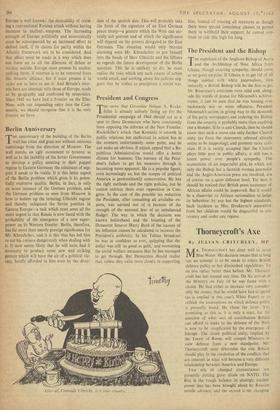President and Congress
THE news that Governor Nelson A. Rocke- feller is already actively lining up for the Presidential campaign of 1964 should act as a spur to those Democrats who have consistently been opposing the reforms of the New Frontier. Rockefeller's attack that Kennedy is smooth in public relations but ineffectual in action has at the moment unfortunately some point, and he can make an obvious, if unjust, appeal that a Re- publican Administration would offer a better climate for business. The manner of the Presi- dent's failure to get his measures through is becoming more apparent. He is a popular figure, even increasingly so, but the temper of political America is predominantly conservative. He has the right methods and the right policies, but he cannot enforce them over opposition in Con- gress. In the case of the possible tax reduction the President, after consulting all available ex- perts, was advised out of it because of the strength of the national fear of an unbalanced Budget. The way in which the decision was known beforehand and the boasting of the Democrat Senator Harry Byrd of the success of his influence cannot be calculated to increase the President's authority. 'TR his Telstar broadcast he was as confident as ever, quipping that the dollar was still 'as good as gold,' and recounting the social welfare measures that he has managed to get through. But Democrats should realise that, unless they unite more closely in supporting all, Comrade Ulbricht, it is your country. . .
him, instead of treating all measures as though there were special conscience clauses to permit them to withhold their support, he cannot con- tinue to ride this high for long.






























 Previous page
Previous page